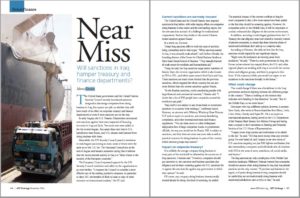The United States government and the United Nations Security Council recently introduced sanctions designed to discourage companies from doing
business in Iraq, but experts are split on whether they will have much of an effect on corporate treasury and finance departments or even if more sanctions are on the way.
In early August, the U.S. Treasury Department announced new sanctions against three men suspected of financing terrorism in Iraq and Syria. Two more men were added to the list in mid-August. Any assets these men had in U.S. jurisdiction were frozen, and U.S. citizens were banned from
doing business with them.
Meanwhile, the UN Security Council passed a resolution in mid-August sanctioning six men, some of whom were the same as on the U.S. list. The European Council met at the end of August and issued a statement saying that it believes that the recent terrorist activity in Iraq is a “direct threat to the security of the European countries.”
The European Council expressed support for the UN Security Council resolution and called on the organization to go even further. “It requests the Council to consider a more effective use of the existing restrictive measures, in particular to deny ISIL the benefits of illicit oil sales or sales of other
resources on international markets,” the EC said.
This article was originally published at AFP Exchange, but is no longer available online.

